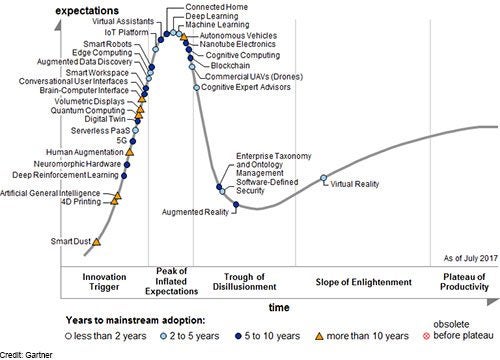The hype surrounding artificial intelligence (AI) is warranted, according to Gartner’s latest “Hype Cycle for Emerging Technologies” report. AI is now a “megatrend,” barreling its way into the IT mainstream.
Currently, a batch of AI technologies like deep learning and machine learning, are perched atop the so-called “Peak of Inflated Expectations,” where reality has yet to catch up to their potential. Yet, a confluence of advancements and innovations in computing that will bring an AI-enabled future closer.
“Artificial intelligence technologies will be the most disruptive class of technologies over the next 10 years due to radical computational power, near-endless amounts of data, and unprecedented advances in deep neural networks; these will enable organizations with AI technologies to harness data in order to adapt to new situations and solve problems that no one has ever encountered previously,” stated Gartner.
Like practically all facets of IT, the field of AI is varied one. Enterprises will want to pay attention to deep reinforcement learning, cognitive computing and conversational user interfaces, often referred to as chatbots. CIOs will also want to keep deep learning, enterprise taxonomy and ontology management, and machine learning on their radars.
AI is already having a major impact on the software industry. Earlier this summer, Gartner predicted that practically all software released by 2020 will include AI capabilities. As with all software that affects how their businesses are operated, IT managers will want to carefully evaluate how those capabilities stack up.
“As AI accelerates up the Hype Cycle, many software providers are looking to stake their claim in the biggest gold rush in recent years,” said Gartner research vice president Jim Hare in a statement. “AI offers exciting possibilities, but unfortunately, most vendors are focused on the goal of simply building and marketing an AI-based product rather than first identifying needs, potential uses and the business value to customers.”
Apart from AI, Gartner has also identified Transparently Immersive Experiences as another megatrend. Taking a more human-centric approach to interacting with users, this group of technologies, which includes augmented and virtual reality (AR and VR) and the connected home, will seamlessly conform to the needs to people and businesses.
Finally, Digital Platforms, the third megatrend, will force enterprises to rethink their IT strategies. Instead of compartmentalized IT infrastructure, Gartner expected “ecosystem-enabling platforms” like the Internet of Things (IoT), blockchain and serverless platform-as-a-service (PaaS), to give rise to new business models that dissolve the barriers between people and technology.
Pedro Hernandez is a contributing editor at Datamation. Follow him on Twitter @ecoINSITE.



